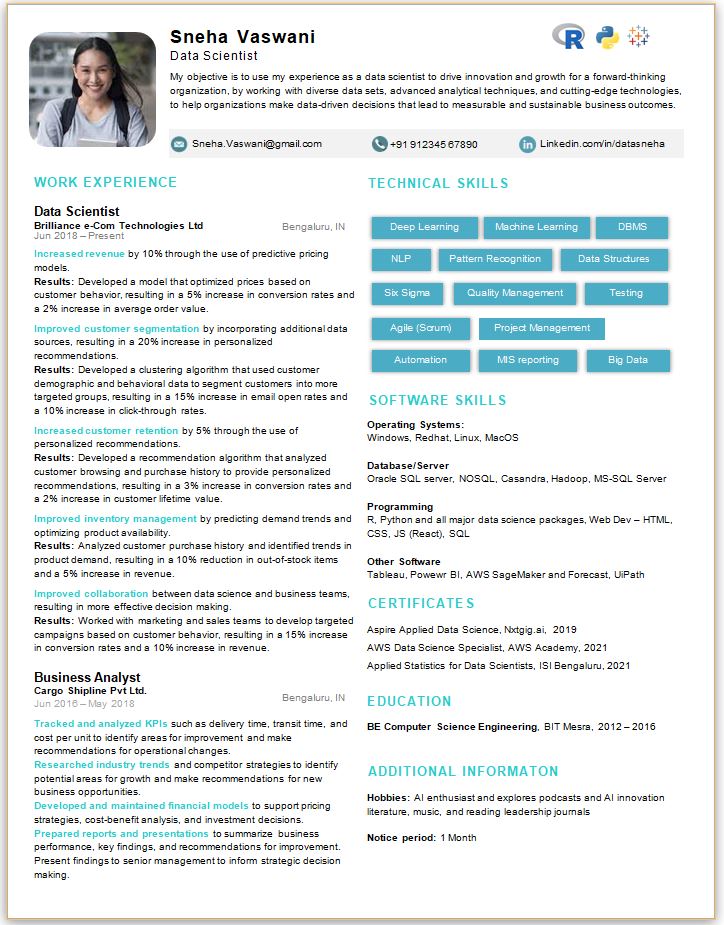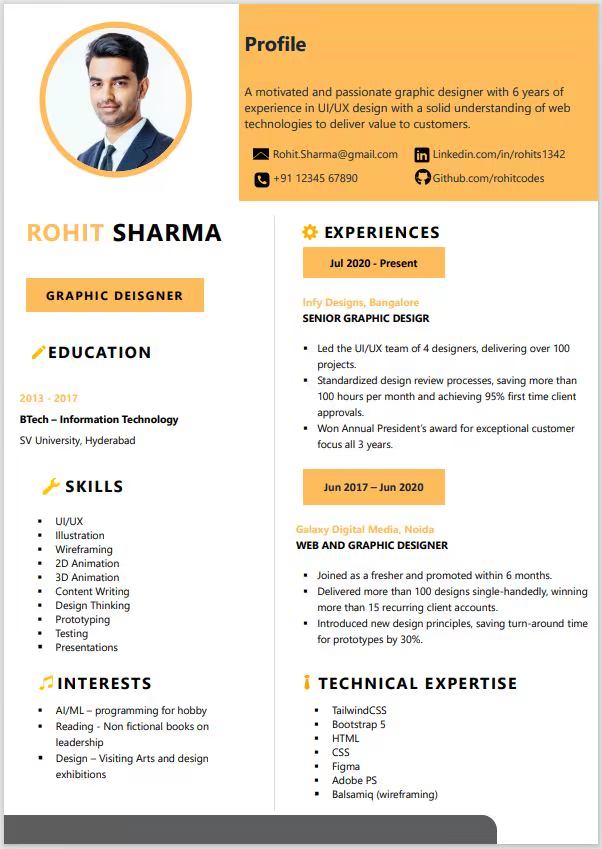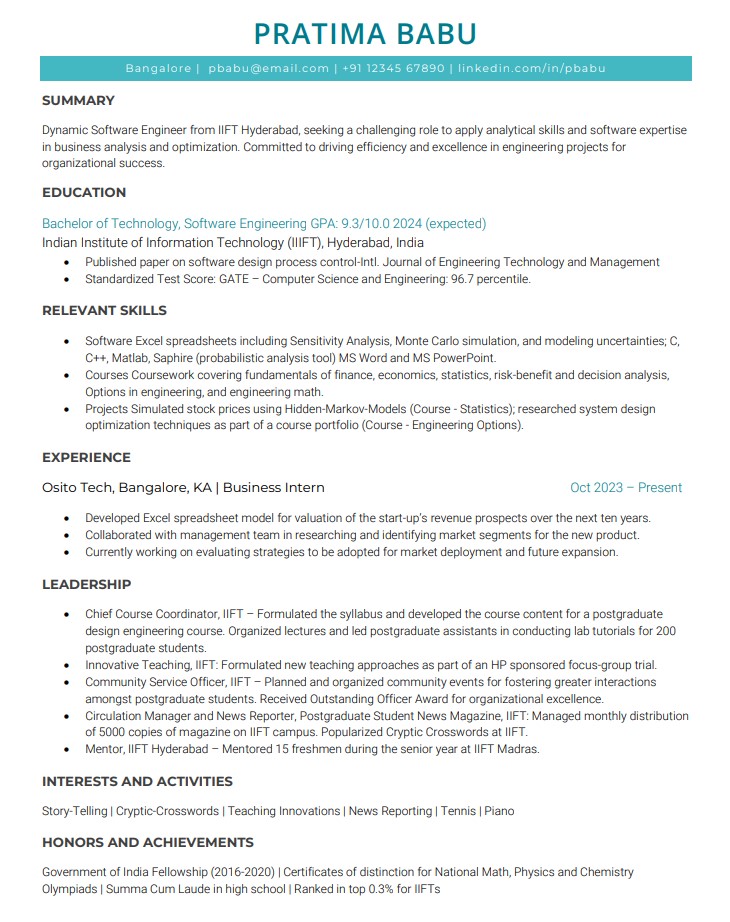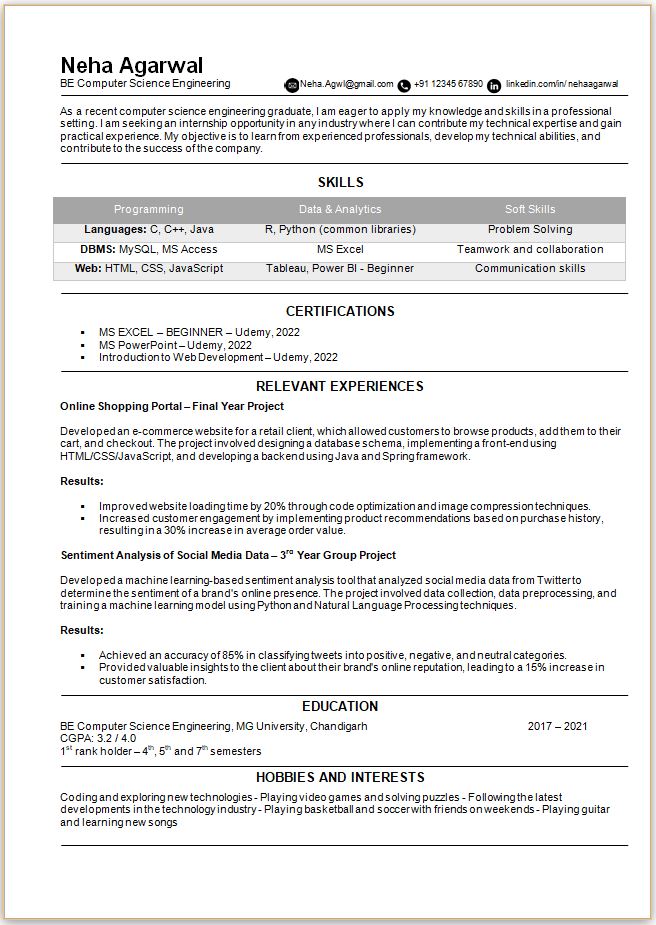Modern Resume
Data Scientist Resume
Data Scientist
DataSci


Objective
My objective is to use my experience as a data scientist to drive innovation and growth for a forward-thinking organization, by working with diverse data sets, advanced analytical techniques, and cutting-edge technologies, to help organizations make data-driven decisions that lead to measurable and sustainable business outcomes.
Education
BE Computer Science
Skills
Machine learning, Deep learning, Data Visualization, Pattern recognition, data structures and algorithms, agile, Project management, RPA, Automated testing and Quality Management
Projects
Project: Customer Churn Prediction
Objective: To develop a machine learning model to predict which customers are likely to churn or leave a subscription-based service.
Process:
Data collection: Collect customer data, including demographic information, account history, usage data, and customer support interactions.
Data cleaning and preprocessing: Clean and preprocess the data, including handling missing values, removing duplicates, and transforming variables.
Feature engineering: Create new features from the data, such as calculating the average usage per day or week.
Model selection: Select and train a machine learning model, such as a random forest or logistic regression, to predict customer churn.
Model evaluation: Evaluate the model's performance using metrics such as accuracy, precision, and recall.
Model optimization: Tune the model's parameters and hyperparameters to improve its performance.
Results:
The developed model achieved an accuracy of 87%, precision of 91%, and recall of 83%. By using this model to identify customers who are likely to churn, the company was able to take proactive measures to retain them, such as offering targeted promotions or personalized customer support. As a result, the company was able to reduce customer churn by 15% and increase customer lifetime value by 10%.
Interests/Hobbies
Programming: Data scientists may enjoy coding as a hobby, and could list the programming languages or projects they have worked on outside of work. Data Visualization: A data scientist may enjoy creating data visualizations, such as building interactive dashboards, creating infographics or exploring data in novel ways. Machine Learning: A data scientist may be interested in exploring machine learning techniques outside of work, such as participating in online machine learning competitions or contributing to open source projects. Analytics: A data scientist may enjoy conducting data analysis for personal projects, such as analyzing sports data or social media data. Problem Solving: A data scientist may enjoy solving challenging problems, such as puzzles or logic games, which could demonstrate their analytical and critical thinking skills.
Experience
Developed predictive models to optimize pricing and promotions:
Achievements: Increased revenue by 10% through the use of predictive pricing models.
Results: Developed a model that optimized prices based on customer behavior, resulting in a 5% increase in conversion rates and a 2% increase in average order value.
Conducted customer segmentation analysis to improve targeting and personalization:
Achievements: Improved customer segmentation by incorporating additional data sources, resulting in a 20% increase in personalized recommendations.
Results: Developed a clustering algorithm that used customer demographic and behavioral data to segment customers into more targeted groups, resulting in a 15% increase in email open rates and a 10% increase in click-through rates.
Developed recommendations and personalization algorithms to enhance customer experience:
Achievements: Increased customer retention by 5% through the use of personalized recommendations.
Results: Developed a recommendation algorithm that analyzed customer browsing and purchase history to provide personalized recommendations, resulting in a 3% increase in conversion rates and a 2% increase in customer lifetime value.
Identified and analyze trends in customer behavior to inform business strategy:
Achievements: Improved inventory management by predicting demand trends and optimizing product availability.
Results: Analyzed customer purchase history and identified trends in product demand, resulting in a 10% reduction in out-of-stock items and a 5% increase in revenue.
Led collaboration with cross-functional teams to drive data-driven decision making:
Achievements: Improved collaboration between data science and business teams, resulting in more effective decision making.
Results: Worked with marketing and sales teams to develop targeted campaigns based on customer behavior, resulting in a 15% increase in conversion rates and a 10% increase in revenue.
Analyzed key performance indicators (KPIs) to evaluate business performance:
Tracked and analyzed KPIs such as delivery time, transit time, and cost per unit to identify areas for improvement and make recommendations for operational changes.
Researched industry trends and competitor strategies to identify potential areas for growth and make recommendations for new business opportunities.
Developed and maintained financial models to support pricing strategies, cost-benefit analysis, and investment decisions.
Prepared reports and presentations to summarize business performance, key findings, and recommendation for improvement. Present findings to senior management to inform strategic decision making.
Additional Inputs
When crafting a resume for data science job applications, including relevant keywords can help catch the attention of recruiters and applicant tracking systems (ATS). Here are some essential keywords to consider incorporating in a data science resume:
Data Analysis: Highlight your expertise in data analysis techniques, including statistical analysis, data mining, and data visualization.
Machine Learning: Showcase your proficiency in machine learning algorithms, model development, and predictive analytics.
Programming Languages: Mention the programming languages you are skilled in, such as Python, R, SQL, Java, or any other relevant languages.
Data Manipulation: Emphasize your ability to clean, preprocess, and manipulate data using libraries and tools like Pandas, NumPy, or SQL.
Big Data: If you have experience working with big data technologies, include keywords like Hadoop, Spark, or distributed computing.
Deep Learning: If you have expertise in deep learning frameworks like TensorFlow or PyTorch, make sure to mention it.
Data Visualization: Highlight your proficiency in creating visually appealing and informative data visualizations using tools like Matplotlib, Seaborn, or Tableau.
Natural Language Processing (NLP): If you have worked on NLP projects, mention it and include relevant keywords like NLTK or spaCy.
Model Evaluation: Discuss your experience with model evaluation techniques, cross-validation, and performance metrics like accuracy, precision, recall, and F1 score.
Feature Engineering: Mention your ability to engineer relevant features from raw data to improve model performance.
Data Science Tools: Include keywords for data science libraries, frameworks, and tools like scikit-learn, Jupyter, Git, etc.
Data Warehousing: If you have worked with data warehousing technologies like Amazon Redshift, Google BigQuery, or Snowflake, include them.
Database Management: Mention database systems you are familiar with, such as SQL Server, MySQL, PostgreSQL, or NoSQL databases like MongoDB.
Data Storytelling: Emphasize your capability to communicate complex findings to non-technical stakeholders through data storytelling.
Collaboration and Teamwork: Highlight your ability to work in cross-functional teams, collaborate, and communicate effectively.
Problem-Solving Skills: Showcase your analytical and problem-solving skills in handling real-world data challenges.
Domain Expertise: If you have experience in a specific industry or domain, mention relevant keywords related to that field.
Remember to tailor your resume and use the most relevant keywords based on the job description and the specific skills and experiences you possess. Use quantifiable achievements to demonstrate the impact of your data science projects and contributions. A well-optimized resume with the right keywords will increase your chances of getting noticed and landing interviews for data science positions.
Why this template works
This is a beautifully crafted simple template and simple resume templates work well for data scientist jobs for several reasons:
Highlighting the content: A simple resume template can help to highlight the content of the resume, such as the candidate's experience, education, and technical skills. This is especially important in data science, where the focus should be on showcasing one's technical expertise and accomplishments.
Easy to read: Simple resume templates are often easier to read and understand, which can be important when hiring managers are reviewing many resumes. Cluttered or overly-designed resumes can be distracting and take away from the content.
Emphasizing technical skills: Simple resume templates can help to emphasize the candidate's technical skills, such as programming languages, data analysis tools, and machine learning frameworks. This can help to demonstrate the candidate's technical expertise, which is often a key requirement for data scientist jobs.
Consistency: A simple resume template can help to maintain consistency throughout the resume, which can make it easier for hiring managers to navigate and review. This can be especially important in data science, where attention to detail and consistency is key.


